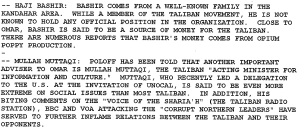I happened to have been following this story closely for several days before the attack, so watching the response has been one of the most absurd spectacles I’ve ever seen the media go through–not a statement I make lightly. This is actually the ninth, and by far the largest, attempt by the group that organized this. This story necessarily starts long before the passengers were killed by Israeli commandos. The website for the Free Gaza Movement has details on all of their trips (the first was in August 2008). On May 24th, as some of the ships were preparing to depart from Cyprus, the Sydney Morning Herald wrote a long story describing the groups latest trip that provides good background.
By May 27th, the Israeli navy was preparing to send commandos after several boats filled with unarmed human rights activists from around the world, including a Nobel peace laureate and a former UN Assistant Secretary General from Ireland, three German MPs, an Israeli Arab MK, a Swedish author, a former Prime Minister of Malaysia, a former diplomat and a retired Colonel (who, in his service, survived a previous run-in with the Israeli military) from the United States, a Holocaust survivor, and six to seven hundred others from over twenty countries.
It’s worth noting that there wasn’t exactly unanimous support for attacking the ships carrying aid to Israel, nor is there unanimous support for the policies necessitating the aid in the first place. Israeli organizations petitioned the government to allow the ships through, and a minority in the government held the same position, but the government’s insane right-wing majority was convinced that breaking the blockade was somehow a threat to Israel. Haaretz columnist Gideon Levy wrote a damning column about the decision:
The Israeli propaganda machine has reached new highs its hopeless frenzy. It has distributed menus from Gaza restaurants, along with false information. It embarrassed itself by entering a futile public relations battle, which it might have been better off never starting. They want to maintain the ineffective, illegal and unethical siege on Gaza and not let the “peace flotilla” dock off the Gaza coast? There is nothing to explain, certainly not to a world that will never buy the web of explanations, lies and tactics.
Only in Israel do people still accept these tainted goods. Reminiscent of a pre-battle ritual from ancient times, the chorus cheered without asking questions. White uniformed soldiers got ready in our name. Spokesmen delivered their deceptive explanations in our name. The grotesque scene is at our expense. And virtually none of us have disturbed the performance.
The chorus has been singing songs of falsehood and lies. We are all in the chorus saying there is no humanitarian crisis in Gaza. We are all part of the chorus claiming the occupation of Gaza has ended, and that the flotilla is a violent attack on Israeli sovereignty – the cement is for building bunkers and the convoy is being funded by the Turkish Muslim Brotherhood. The Israeli siege of Gaza will topple Hamas and free Gilad Shalit. Foreign Ministry spokesman Yossi Levy, one of the most ridiculous of the propagandists, outdid himself when he unblinkingly proclaimed that the aid convoy headed toward Gaza was a violation of international law. Right. Exactly.
The following day, a still unknown number of civilians were dead (likely somewhere between ten and twenty) and dozens more were wounded. There was no turning back now. The government and the military began a public relations campaign to try to minimize the fallout by selectively censoring the domestic media, severely restricting the foreign media, and feeding lies to the US media to be relayed more or less uncritically. This is the point where the absurdity really begins.
It seems that the problem isn’t what happened, but how it will be perceived which is itself a very confusing issue (with overt racial overtones).
A columnist at the Jerusalem Post, where Wolf Blitzer began his career, fumes:
As expected, the provocation mounted by Muslim organizations in association with “peace activists†was successful beyond their wildest dreams: There were casualties. They can now continue pointing the finger at Israel and blaming it for everything under the sun. The organizers of the flotilla, a fanatic Turkish organization known under the initials IHH and its European partners, had repeatedly and explicitly declared before setting out that their purpose was to break the Gaza siege and embarrass Israel.
The humanitarian supplies brought on board were just a ploy to hide their avowed objective. Israel did all it could to stop it. Appeals to Turkey went unheeded and that country let the flotilla sail and gave its assistance. Israel offered to have all humanitarian supplies brought to the Ashdod port where they could then be sent to Gaza through our crossings. Israel also asked the “peace militants†to transmit a letter to captured IDF soldier Gilad Schalit, who has been in Hamas custody for almost four years. The militants were not interested in any humanitarian operation. They wanted to carry out their joint Arab-European propaganda offensive against Israel in order to delegitimize the Jewish state, deepen its isolation and provoke an international outcry.
….
Unfortunately we are the target of an Arab and international propaganda offensive characterized by the deliberate refusal to present the Israeli positions and indeed anything positive about that country. This is “political correctness†in its starkest expression. The organizers of the so-called humanitarian operation understood only too well that they could go on with their plans secure in the support of the Arab and European media.
A Haaretz story details how some Israelis (who probably haven’t been told the truth), “brandished their keyboards and went to war, fighting to save Israel’s image” on Facebook and Twitter.
On the floor of Israel’s legislative body, the Knesset, a legislator who was aboard one of the ships (and treated the wounded) is denounced by a member of the governing party:
MK Miri Regev (Likud) said Zoabi is “responsible for a double crime: Joining terrorists, and a moral crime against the state of Israel.” Regev then called at her in Arabic: “Go to Gaza, you traitor.”
“She sat here over a year ago and pledged allegiance to the state of Israel and its laws,” Regev claimed. “I have no intention of stifling free speech, but in the case of MK Zoabi – it is not freedom of speech. The Gaza flotilla was a terrorist flotilla and MK Zoabi needs to be punished. We don’t need Trojan horses in the Knesset.”
This narrative is extremely familiar to our own right-wing nuts and they’ve carried this narrative over to the United States seamlessly. Michelle Malkin has dubbed it the “thug flotilla” and hopes the Israelis kill the passengers on the remaining boat carrying the thuggish 1976 Nobel Peace Prize laureate Mairead Corrigan Maguire.
Former Reagan Assistant Treasury Secretary Paul Craig Roberts explains the mentality of his estranged ideological allies:
Many Christian evangelicals, brainwashed by their pastors that it is God’s will for Americans to protect Israel, will believe the Israeli story, especially when it is unlikely they will ever hear any other. Conservative Americans, especially on Memorial Day when they are celebrating feats of American arms, will admire Israel for its toughness.  Here in north Georgia where I am at the moment, I have heard several say, admiringly, “Them, Israelis, they don’t put up with nuthin.â€
Conservative Americans want the US to be like Israel. They do not understand why the US doesn’t stop pissing around after nine years and just go ahead and defeat the Taliban in Afghanistan. They don’t understand why the US didn’t defeat whoever was opposing American forces in Iraq. Conservatives are incensed that America had to “winâ€Â the war by buying off the Iraqis and putting them on the US payroll. Israel murders people and then blames its victims. This appeals to American conservatives, who want the US to do the same.
Coincidentally, another former Reagan official was on one of the boats and has been interviewed by NPR:
“We awakened to have the commandos already on board. They’d come up very quietly in their little boats, their Zodiacs. There was just enough time to get a small passive resistance effort started — tried to keep them out of the wheelhouse and away from the engine room. Some people got roughed up, punched and kicked, and you know, arms twisted, and some cuts and bruises and things along that line. Nothing critical at that point.”
“We had talked about what to do and how to be non-violent because the last thing you want to do is provoke armed soldiers. I’ve seen three newspapers since the plane landed in New Jersey, and several times the Israelis have been quoted as saying that their guys were armed with paint guns. Well, indeed they were, as well as pistols and automatic rifles and stun(?) grenades and pepper spray.”
“It was a humanitarian aid mission. And I cannot speak for anybody on that trip except me and the people that I was associated with in going over there. And our hope was that the Israelis come to the conclusion that what they should do, which would avoid the kinds of things that have happened now, was to let the materials come in.”
“Well, you now, nobody wants anything bad to happen to Israel, understand, and I’m certainly in that category. But I fear that bad things are going to happen if they keep doing what they’re doing. And not just to Israel, bad things are going to happen to Palestinians and to Americans, because of what is happening in Palestine and also because of what is NOT happening in Palestine. All three groups are going to suffer.”
I never imagined I’d be wanting people to listen to a former Reagan diplomat so badly.











